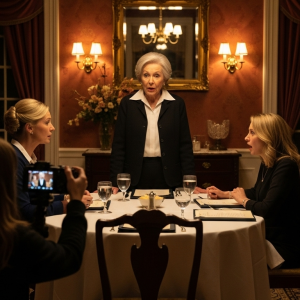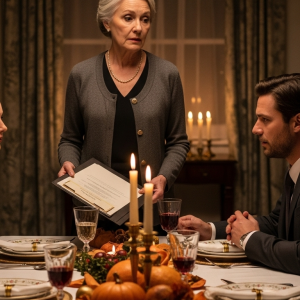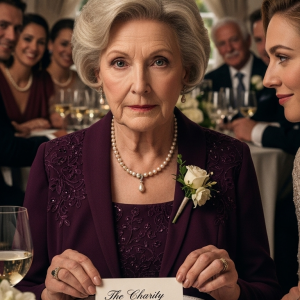“We’re cutting ties. Don’t come to family dinner anymore.”
The text from my son, Alexander, arrived in the family group chat at 9:47 AM. The whole family watched in silence as I, Margaret Wilson, was publicly executed via thumbtaps. The next morning, I made a single phone call that would incinerate the world he had built upon my name.
What Alexander didn’t know was that for three years, I had been collecting evidence of his crimes.
The message was a masterclass in casual cruelty. I was wearing my grandmother’s pearl necklace, sipping green juice in my Upper East Side apartment, when my phone buzzed. Thirty years of tradition, dismissed. My daughter-in-law, Victoria, replied with a crying-laughing emoji. My brother, Robert, left it on read. Not one person defended me. I took a screenshot. Evidence, darling. Always collect evidence.
The most recent photo in the chat was from their Hamptons vacation. My money had funded those designer swimsuits. The salary from the company I built paid for every caviar-topped moment. The irony was so thick you could serve it at a dinner party.
I walked to my window. Sixty-seven floors below, New York hummed with people building empires and destroying enemies. How fitting. I picked up my landline and dialed a number I’d memorized three years ago but never used. The number I kept for exactly this moment.
Two rings. “Margaret Wilson,” a voice answered.
“Eleanor,” I said. “I think it’s time we had that conversation.”
The voice on the other end laughed—a rich, knowing sound. “I was wondering when you’d call.”
“Wonder no more. How quickly can you meet?”
“For you? I can be there in an hour.”
I hung up. The woman staring back at me from the chrome coffee maker was not the same one who’d read that text ninety minutes ago. This woman had squared shoulders, a lifted chin, and something dangerous in her eyes. Alexander wanted to cut ties. Perfect. I’d hand him scissors so sharp he wouldn’t see the cut until he was already bleeding.
My phone buzzed again. Alexander. I declined the call. And again. And again. How delicious. Twenty-four hours ago, I was dead weight. Now, I was suddenly worth his desperation.
I typed one last message into the family chat. “Message received loud and clear. Enjoy your last family dinner.” Then, I left the group.
The family meltdown was immediate. Alexander called seventeen times. His texts grew frantic. “Mom, what did you mean by ‘last dinner’? Victoria’s having a panic attack! Are you happy?”
Oh, that was precious. The woman who’d spent two years systematically erasing me was now hyperventilating because I’d finally fought back. I screenshotted every message.
Eleanor Hartwell stepped off my private elevator looking like she’d walked out of a hostile takeover and won. Armani suit, Louboutin heels, and a smile sharp enough to perform surgery. “Margaret,” she said, air-kissing my cheeks. “You look radiant. Revenge suits you.”
“I haven’t even started yet,” I replied, leading her to the living room where contracts were spread across the coffee table like battle plans. “Champagne? We’re celebrating.”
“What exactly are we celebrating?”
“Alexander’s education. He’s about to learn what happens when you dismiss the woman who built his playground.”
I handed her a folder thick enough to choke a horse. Bank statements, email printouts, recorded conversations. “Alexander thinks he’s been clever, moving company funds through offshore accounts. And sweet Victoria has been treating our charitable foundation like her personal shopping budget.”
Eleanor whistled. “This isn’t just embezzlement. This is a buffet of felonies. Fraud, tax evasion, breach of fiduciary duty.”
“So, what’s your endgame?” she asked.
“Simple. You buy my 49.8% of Wilson Enterprises with very specific performance clauses. Clauses that give you the authority to audit every department, restructure management, and remove anyone guilty of financial irregularities.”
“And your son?”
“Alexander is about to discover that actions have consequences. Victoria is going to learn that stealing from the wrong woman can end careers permanently.” We clinked glasses. The war had begun.
The revelation that solidified my resolve came from my grandson, Luke. At midnight, my sweet, nineteen-year-old grandson—the only family member with a moral compass—called me, his voice shaking.
“Grandma, they’re saying you’ve lost your mind. Dad says you threatened to destroy the business out of spite.”
“And what do you think, sweetheart?”
“I think they’re lying. You don’t do anything out of spite. You do things because they’re right.” He paused. “But Grandma, they’re telling everyone you never loved Dad. That you only cared about money and power.”
I sat in the darkness, the city lights twinkling below, and felt my heart crystallize into pure determination. “Luke, I need you to understand something. Wilson Enterprises employs 3,000 people. Your father and Victoria have been stealing from that legacy. From those employees. From your future.”
I explained it all—the diverted funds, the offshore schemes, the fake vendor contracts. Luke, a Columbia business student, understood immediately. “Jesus Christ, Grandma.”
“Language. But yes, indeed.”
“So when you sold your shares to Eleanor…”
“I sold them to someone who can perform surgery without anesthesia,” I finished. “Someone who won’t let family sentiment interfere with justice.”
Before we hung up, Luke made a confession. “Actually, Grandma… I’ve been documenting their spending for months for a class project on family business ethics. Want to see Dad’s credit card statements?”
Twenty minutes later, I was staring at financial records that would make a prosecutor weep with joy. Luxury vacations charged to company accounts, a $30,000 wine collection listed as “office supplies.” I forwarded everything to Eleanor. Her reply was instant: You’ve raised a delightfully ruthless grandson.
At 3:00 PM, my landline rang. It was Alexander. “Mom, we need to talk.”
“Do we? Yesterday you were quite clear about cutting ties.”
“I was angry… Eleanor’s threatening to fire half the management team!”
“How terrible. Maybe they should have managed better.”
“This isn’t a joke!”
“You’re right. Embezzlement is very serious. I hear orange jumpsuits are quite slimming, though.” The sound he made was somewhere between a whimper and a death rattle.
“What do you want?” he pleaded.
“Nothing you’re capable of giving, Alexander.”
“Money? I’ll give you money!”
“With what?” I asked sweetly. “Your Cayman Islands account is frozen.”
The silence was exquisite. “How do you know about—”
“I know everything, darling. I’ve known for three years. I was simply waiting for you to hand me the knife.”
The first direct confrontation happened in the Wilson Enterprises boardroom. Alexander tried to stage a coup. Instead, he walked into a carefully orchestrated ambush.
I arrived in a Chanel suit that made me look like I could buy and sell countries before lunch. Eleanor had invited me as a “consulting advisor”—corporate speak for a ringside seat to the implosion.
Alexander stood at the head of the table, his voice shaking. “This audit is harassment! Eleanor is overstepping her authority as a minority shareholder!”
“Majority shareholder,” Eleanor corrected smoothly. “I now own 51% of Wilson Enterprises. I purchased additional shares from your Uncle Robert and Aunt Janet last night. They were quite eager to sell after learning about the pending federal investigation.”
The temperature in the room dropped twenty degrees. “Federal investigation?” Alexander’s voice cracked.
“Oh, yes. The FBI finds embezzlement fascinating.” Eleanor slid photos and bank statements across the table. Alexander’s hands trembled. “This is a misunderstanding,” he stammered.
“A $60,000 watch is a misunderstanding?” a board member asked sharply.
“Charged to the Children’s Cancer Foundation account,” Eleanor added helpfully.
I stood slowly, my heels clicking on the marble like a countdown timer. “Alexander,” I said, my voice like steel wrapped in silk. “Do you remember what I taught you about consequences when you were seven? After you stole cookies and blamed the housekeeper?”
His face crumpled. “You made me confess and work to pay back her lost wages.”
“Exactly. Actions. Have. Consequences.” I turned to the room. “My son has forgotten this lesson. Today, he remembers.”
Eleanor consulted her notes. “Alexander Wilson, by majority shareholder vote, you are hereby terminated from all positions, effective immediately. Security will escort you from the building.” Victoria finally found her voice. “Margaret, you’re destroying your own family!”
I looked at the woman who had erased me, stolen from charities I’d built, and convinced my son to treat me like garbage. “Darling,” I said, adjusting my grandmother’s pearls. “I’m not destroying anything. I’m simply taking out the trash.”
Alexander’s pathetic retaliation came a week later: a lawsuit claiming I suffered from dementia and was a victim of “elder manipulation.” He argued I was too mentally incompetent to sell my shares legally.
I scheduled a press conference. Standing before the assembled media, I held up the folder of evidence I had personally compiled over three years.
“These are the financial records I collected through my allegedly ‘diminished mental capacity,'” I announced. Laughter rippled through the room. “My son and his wife stole from employee pensions and children’s cancer charities. When caught, they didn’t offer remorse. They attacked my competence.”
“How do you respond to claims you were manipulated?” a reporter asked.
“I respond by pointing out that I graduated Summa Cum Laude from Wharton, built a $300 million company, and documented financial crimes that federal agents called ‘prosecution-ready.’ If that’s diminished capacity, I’d hate to see what they consider sharp.”
“What’s next for Wilson Enterprises?”
“Excellence. Integrity. A return to the values that built this company before it was corrupted by people who confused theft with strategy.” I walked away from that podium not just vindicated, but reborn.
Six months later, I sit in my downtown loft. Alexander is a junior analyst at some consulting firm, a smaller, shrunken version of the man he was. Victoria is a “lifestyle influencer” in L.A., using a fake name to hide from her criminal record. They are footnotes in a story that is no longer about them.
The money they stole now funds the Wilson Foundation’s new scholarship program, sending fifty brilliant young women to university every year. Eleanor and I have a consulting firm, helping other family businesses navigate corruption—the “Margaret Wilson treatment,” she calls it. Netflix is making a documentary.
My son tried to make me disappear. Instead, he made me unforgettable.
The best revenge isn’t destroying your enemies. It’s becoming so powerful, so fulfilled, and so at peace that their actions become irrelevant, their opinions become noise, and their absence becomes a gift. Victory isn’t revenge. It’s peace.
Of course. Here is the continuation of the story, written in English.
The new legacy I’d built over the past six months was proof that the best revenge is living so well that your enemies become irrelevant. I sat in my downtown loft, surrounded by art instead of corporate awards, funding dreams instead of fighting nightmares, and finally understanding what true power looked like.
This morning started like every Saturday. Luke arrived at 10:00 AM with coffee and croissants, settling into his regular spot on my Italian leather sofa. At nineteen, he possessed more integrity than his father ever managed, and watching him grow into a man of principle has become one of my greatest joys.
“Grandma, Professor Martinez wants to interview you for his new book on ethical leadership,” he said, pulling academic papers from his backpack. “Also, three more family businesses have contacted the university asking for guidance on transparency initiatives.”
I laughed, reviewing applications for the Wilson Foundation’s latest scholarship program. Fifty brilliant young women from low-income families, each receiving full university funding. The money Victoria had stolen to buy designer handbags now purchased an education for the next generation of female leaders.
My phone rang, but it wasn’t Eleanor or a reporter. It was an unknown number from California. “Mrs. Wilson?” a professional female voice asked. “My name is Dr. Albright, a school psychologist at Westview School in Los Angeles. I’m calling about your grandchildren, Aiden and Olivia.”
My heart seized. “Is something wrong?”
“They aren’t in trouble, but they are struggling. Their mother, Victoria, has told them a… different story about recent events. In her version, you are a cruel grandmother who stole the family company and put their father in prison out of greed.”
A silence fell over the loft. Luke looked over at me, his expression hardening with concern.
Dr. Albright continued. “Aiden is getting into fights at school, and Olivia’s grades have plummeted. They are defending their parents’ honor, but they are also confused and hurt. They need a stable truth. I think… they need to hear the story from you.”
After I hung up, I stared out the window, the peace I had so carefully cultivated feeling fragile for the first time. I had won the war, but this was the collateral damage—the innocent victims caught in a battle I had started.
“What are you going to do?” Luke asked softly.
“Victoria is using her own children as her last remaining weapon,” I said, my voice colder than I intended. “She is poisoning them with lies because she has nothing left.”
“You can’t let her do that,” Luke insisted. “They’re family.”
He was right. I had exiled the corrupt, rebuilt the company, and restored my own name. But I had left two wounded children on a battlefield I had created. They were being raised on a toxic narrative that would twist them into bitter, resentful adults. A new front in the war had just opened—not for a company, but for the future of my own bloodline.
I spent an hour in silence after Luke left, weighing my options. A call to Victoria would be useless; she would only shriek and hang up. Sending lawyers would be perceived as an attack. Flying to L.A. to confront the children myself felt like an ambush.
The problem was not Victoria’s lies. The problem was the absence of Alexander’s truth.
I picked up the phone and dialed a number I had not called in almost a year. A number for a man living in a court-mandated apartment, working a junior analyst job, and living a life hollowed out by his own mediocrity. He answered on the second ring, his voice wary. “Hello?”
“Alexander,” I said. My voice was not cold; it was surgical. “We need to speak. Not as mother and son, but as the two people responsible for the world your children are living in. My boardroom. Tomorrow at ten.” I didn’t wait for a reply. I hung up.
The next morning, I waited in the conference room where I had orchestrated his termination. The space was bright, clean, and humming with quiet efficiency. It was a room that held no memory of him; it was entirely mine.
He arrived precisely at ten, looking like a ghost haunting his former life. The expensive suit was gone, replaced by a rumpled blazer. He was thinner, his eyes holding a permanent look of weary defeat. He did not look at me, but at the chair at the head of the table—his former seat, now mine.
“Sit, Alexander,” I said, gesturing to a guest chair across from me.
He complied, his movements stiff. “What is this about?”
I didn’t waste time. I relayed the conversation with Dr. Albright in detail. “Your son is acting out his anger in the schoolyard. Your daughter is sacrificing her future because she’s crippled by a false narrative. Their mother is feeding them poison, and you are allowing it through your silence. This is the legacy you are leaving them.”
He flinched, the words finding their mark. For the first time, he looked at me, and I saw something beyond self-pity. I saw genuine pain.
“What do you want me to do?” he whispered. “She has them. I get one supervised phone call a week. She listens to every word.”
“I want you to tell me why you did it,” I said, my voice steady. “Not the excuses you told the lawyers. The truth. Your children deserve to one day understand the man their father truly was.”
He looked down at his hands. “Because I was weak,” he said, the admission a ragged breath. “Because I lived my entire life in your shadow. The company was never mine; it was always Margaret Wilson’s creation. I was just the placeholder son. I hated it. I hated feeling like a footnote in your story.”
“So you decided to burn the book,” I finished for him.
“I just wanted something that felt like mine,” he said, his voice cracking. “Even if I had to steal it to feel powerful.”
I let the pathetic truth of his confession settle in the air between us. There was no grand evil, no master plan. Only the petty jealousy of a man who mistook inheritance for achievement.
“You didn’t want to build something, Alexander. You wanted my success without my struggle. You wanted the crown without the fight. And when you discovered how heavy it was, you blamed the person who forged it.”
I leaned forward, my tone leaving no room for negotiation. “You have one thing of value left to give your children. One final act of fatherhood. And you will do it.”
“What?”
“The truth. You will find a way—a letter, a recorded message, a conversation with the therapist—and you will tell them everything. You will tell them you stole from this company, that you betrayed your employees, and that you lied to everyone, including them. You will tell them that I was right to stop you. You will become the villain in their story, Alexander, so they have a chance at a life that isn’t built on a lie.”
He stared at me, his eyes wide with the horror of what I was asking. I was not offering forgiveness. I was demanding sacrifice.
“And if I do?” he asked.
“Then you will have done one honorable thing for your children. You will have given them the freedom that comes from knowing the truth. And I will set up a trust for both of them that you and Victoria can never touch, ensuring they have the future you and she tried to steal.”
I stood up, the meeting concluded. “If you refuse,” I added, walking toward the door, “then I will fly to Los Angeles myself and I will dismantle Victoria’s fantasy world brick by brick. But I promise you, the truth will sound much better coming from a father they love than from a grandmother they’ve been taught to hate.”
He didn’t answer. He didn’t have to. I left him alone in the glass-walled room, a broken man surrounded by the empire he had lost, finally faced with a choice that had nothing to do with money or power, and everything to do with the sliver of a soul he had left.
Later that evening, I received an email. It was a copy of a letter Alexander had sent to Dr. Albright to be given to his children, a full and brutal confession of his crimes, his weakness, and his regret. It was the most honest thing he had ever written.
My phone buzzed with a text from Luke. Dr. Albright called me. She said Alexander sent a letter. She thinks it’s the breakthrough they needed.
I looked out at the city lights, no longer a conqueror surveying her victory, but a matriarch surveying her domain. The battle was over, but the work of rebuilding—truly rebuilding—was just beginning. The peace I felt now was different. It wasn’t the triumphant peace of a victor. It was the quiet, profound peace of resolution, the kind that comes from cleaning up the last remnants of a war and ensuring the next generation could finally grow in stable ground. It was the hardest thing I had ever done. And the most necessary.




